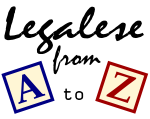Legalese From A to Z: 5 Legal Terms Beginning With ‘E’
 |
The ability to understand legalese, the specialized language used by lawyers, judges, and others in the legal field, is essential to understanding and resolving legal issues.
In our continuing series Legalese From A to Z, we examine the meaning and purpose behind some important bits of legalese. Today, let’s look at five legal terms that begin with the letter “E”:
- Encumbrance. An encumbrance is a claim or interest against property– such as a lien, mortgage, easement or lease — that makes the property less valuable, but does not prevent it from being transferred to another owner.
- Esquire. Esquire is the courtesy title given to lawyers, usually abbreviated after a lawyer’s name as “Esq.” (for an example, check out the byline of this post). It comes from the French escuier, meaning squire, which itself comes from the Latin scutarius, meaning “shield bearer.”
- Ex parte. Ex parte is used to indicate a legal matter on behalf of or involving only one of the parties to the matter, typically in the absence and without notice to the other party. For example, a party seeking a temporary restraining order (TRO) can do so ex parte because of the urgent need for protection.
- Excited utterance. Statements that are considered hearsay are usually not admissible as evidence in court. However, an “excited utterance” is an exception to this rule, allowing a hearsay statement to be admissible if it is made by a person under the stress caused by a startling event — such as an auto accident — concerning the event.
If you need help with defining a legal word or phrase, check out FindLaw’s Legal Dictionary for free access to more than 8,000 definitions of legal terms. And check back here next Sunday, when Legalese From A to Z will define and clarify five more legal terms, beginning with the letter “F.”
Related Resources:
Law and Daily Life
Bài Liên Quan:
Không có bài liên quan.
